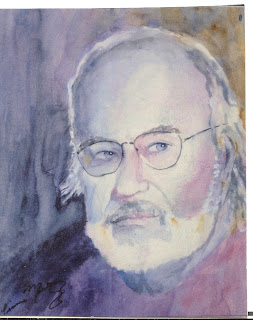Nonsensical Discourse


Dear Friend,
So much of religious discourse is non-sensical because no one has direct, verifiable language about God. When we talk about God, we are really talking about ourselves, and if we venture to talk about God, we usually end up with two kinds of words, anthropomorphic and negative, as in Father and infinite. The anthropomorphic words are about ourselves while the negative say nothing at all, save that we don't know. A better word for the "I don't know kind of words" is "mystery" which indicates that it may be knowable someday but not now.
Another difficulty with discourse about God is that God is not an object or a subject and certainly not an indirect object because if that were the case, God could be confined within the limits of a sentence, nonsense at best.
One of the most interesting words in the Old Testament in reference to God is El Shaddai which is translated "God Almighty." It literally means "God of the Mountains." If one has ever been in the Southwest, especially Monument Valley, which has terrain much like the Sinai Peninsula, one can begin the understand what the ancient Hebrews had in mind when describing their experience of God, a stark, empty, void, powerful mystery.
In other words, religious discourse begins with experience, not concepts which means that religious discourse is really not about God at all but about human experience of God. The ancient Hebrew began with awe while most moderns appear to start with attempts of manage or sequester God.
When we use descriptive words for God, we are actually describing how we perceive our relationship to God. When we speak of God, then we used negative words. Perhaps, the best word for the negative is "Void," which means that no definition or description is possible. Void is not a term of atheism, but rather of agnosticism which means that we don't know. While we sense a Presence in our lives, we cannot define the Presence.
After years of observing people and trying to come to terms with myself, I've concluded that I know very little, perhaps little glimmers now and then. The image used by one of my philosophy professors in college, W. T. Stace, was that of a firefly or glow worm, what's called bioluminescence. However, that does not mean that I have never experienced being loved and loving someone else or that I couldn't make sense of things from time to time.
Religion is a primitive experience. By that I do not mean, stupid or unsophisticated. I mean early, prior to the rise of thinking in terms of objects and subjects which occurred with the invention of written language. Only after the rise of written language could people "act against the better instincts" as when we act according to a concept without paying attention to ourselves. Nowadays, we talk about "getting back to the real me" as though we have to thread our way through jungles and thickets of concepts and ideas to find ourselves.
Oddly, the spiritual means going primitive, not in the sense of beating drums and hanging out in sweat lodges, but in getting behind and beyond all babble of disconnected ideas and in paying attention to the primal experiences of our own lives. The spiritual is neither a rush of emotion nor a concept. The Christian faith is at heart about an experiential encounter, an awareness of a Presence, a Void in which there is the surprise of grace, Jesus Christ.

